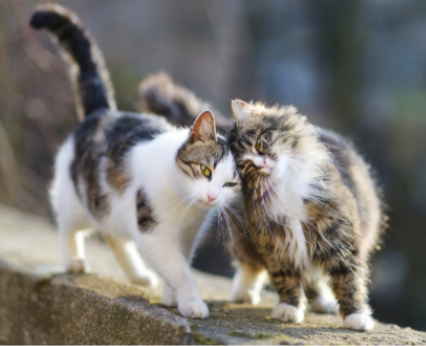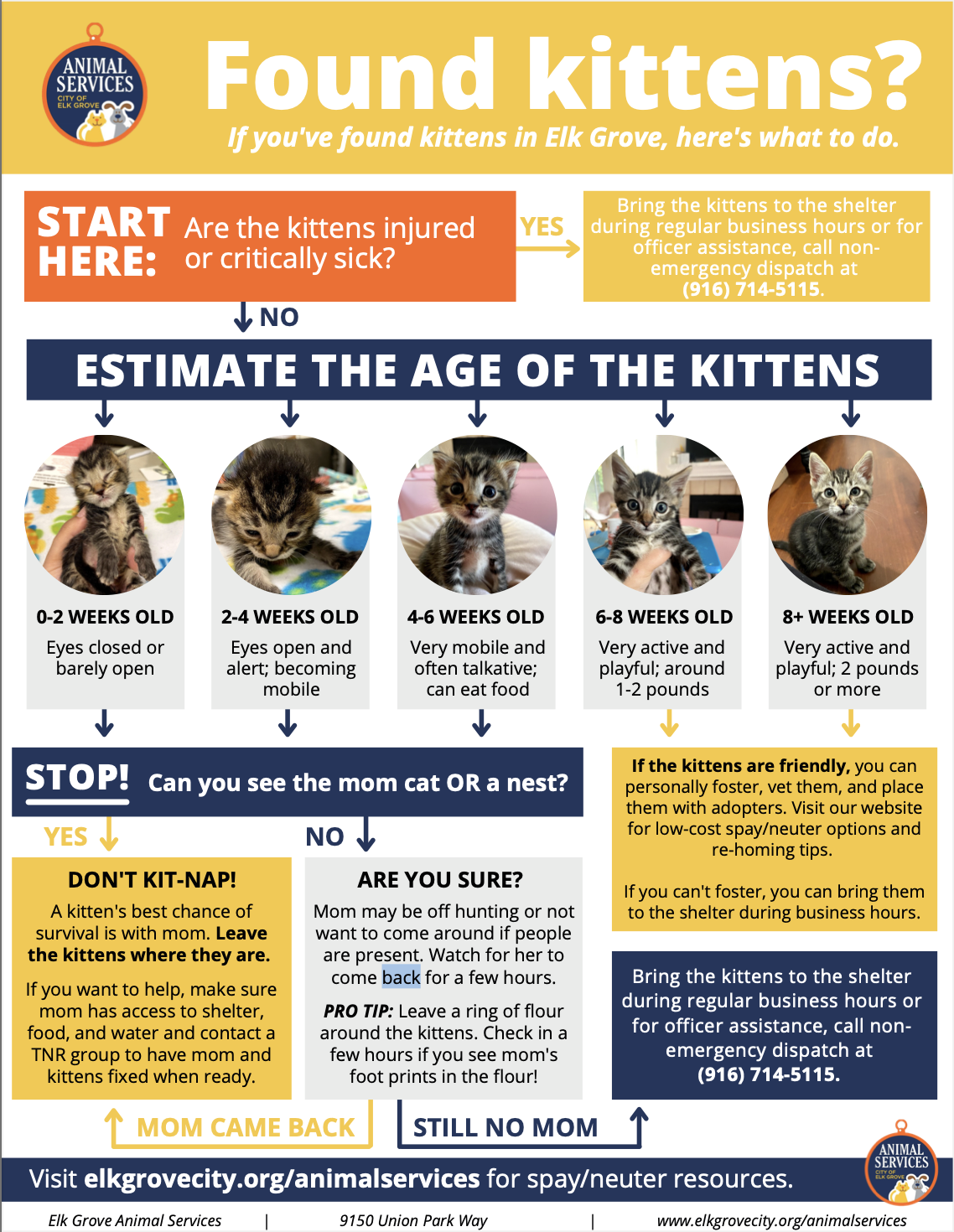Trap, Neuter and Release Program
Trap, Neuter and Release, or Trap-Neuter-Return (TNR), is the humane approach to addressing community cat populations. It improves the lives of cats, addresses community concerns, reduces complaints about cats, and stops the breeding cycle.
TNR improves the co-existence between outdoor cats and humans in our shared environment. The Elk Grove Animal Shelter provides TNR services to cats that are located within the city limits of Elk Grove. Some of the benefits include:
- Relieves cats of the constant stresses of mating and pregnancy;
- Mating behaviors cease, such as roaming, yowling, spraying and fighting;
- Physical health of the cats improves, due to spaying and neutering; and
- Cats are vaccinated against rabies.
We are temporarily able to provide our trap-neuter-release program.
Requirements:
- Trappers are limited to 2 cats per clinic.
- Cats must be contained in a humane cat trap, one cat per trap will be accepted.
- Cats must be trapped in Elk Grove city limits.
- Do not schedule an appointment until you have a trapped cat in your possession.
Check in for the clinic is 8:00 am and pick up is 4:00 pm, located at 9150 Union Park Way, Elk Grove, CA 95624
Make an appointment for an upcoming TNR clinic
More community cat services:
Cat Trap Loan
Elk Grove Animal Services supports Trap / Neuter / Return for feral cats and will loan cat traps to you for the purpose of participation in the TNR program.
Rental from us will require a cash or check refundable deposit of:
- Classic Humae Cat Traps: $60.00
- Manual Drop Trap: $110.00
- Remote Drop Trap: $285.00
Please contact the shelter directly if you would like to arrange for a trap rental.
Outdoor Cats: Your Help Can Keep Them Healthy and Safe
You may have found a cat outdoors. This could be a feral, community cat, or an owned outdoor cat. Each type of cat has unique needs, but they all have one thing in common: if they are not sick or injured, they should not be taken to an animal shelter.
What are the different types of outdoor cats?
- Feral cats are wild cats that have never been socialized to humans. They are often wary of people and may live in colonies with other cats.
- Community cats are socialized cats that live outdoors. They may be cared for by someone or have adapted to feel comfortable around humans. These cats exclusively live outdoors, sometimes sleeping in barns, garages, or on porches.
- Owned outdoor cats are cats that have a home but are allowed to spend time outdoors.
Why should I not take a healthy outdoor cat to a shelter?
Cats were exclusively outdoor animals until the 1940s, when kitty litter was invented. Outside of the US and Canada, cats live outdoors, as predators and wildlife. Cats have domesticated humans so successfully in the United States and Canada, it can be difficult to resist providing intervention; but across the world, even here, cats are adapted to the elements and their environment.
Since cats have been domesticated, a large majority of those who enter the shelter, have been euthanized, about 57%! Shelters are often overcrowded; Outdoor cats are used to living in their own territory and may become stressed and sick by being contained in a kennel. A cat outdoors that is not sick or injured is living proof they know how to take care of themselves! You can support this success!
How can I help outdoor cats succeed?
There are many ways to help outdoor cats succeed in their natural environment. Here are a few ideas:
Provide food and water.
Build shelters to protect cats from the elements.
Prevent predators from accessing the cats' territory.
Trap-neuter-return (TNR) is a program to humanely reduce the feral cat population. TNR involves trapping feral cats, spaying or neutering them, and then returning them to their environment.
Learn more about our TNR program.
How do I know which kind of cat I am seeing?
 Feral |  Community Cat |
| You typically won’t see a feral cat. They hide and sleep in the day and hunt at night. They might even use your secured yard to give birth. Ferals avoid human contact and may be territorial with unknown cats. They will bolt or freeze if you look their way! They are professionals in the wild and make great barn cats! If you see an excess of ferals in your area, there may be a colony with a caretake, or it may be a breeding ground. If you see an ear-tip, the cat has already been fixed and vaccinated. Want to help? Utilize our Trap-Neuter-Release (TNR) program to humanly control the feral cat population, leaving just a few altered cats in your area. No new kittens, and no rodents. Win! Win! | These cats are so tempting to pet! Humans are a resource, and they know it! They may gaze at your indoor cat through windows, nap on your porch and frequently visit your home, if they know they will find food. Community cats are confident in general but may be spooked easily. They may have shiny, clean coats, and look healthy. This means they are thriving! Has a cat ever “adopted you”? That cat made you a part of their community! If you see an ear-tip the cat has already been fixed and vaccinated. Want to help? Utilize our Trap-Neuter-Release (TNR) program to humanly keep this population controlled. Want to make this cat a pet? If they are social enough to be handled and contained; take them to your vet where they can be rabies vaccinated, microchipped, and then licensed at your city hall or local animal shelter. |
 Cat ear tips: A sign of a cared-for cat
Cat ear tips: A sign of a cared-for cat
If you see a cat with an ear tip, it's a good thing! It means that the cat has been spayed or neutered, which helps to reduce the feral cat population and improve the lives of all cats.
Ear tipping is a safe and humane procedure that is performed while the cat is under anesthesia for spay or neuter surgery. A small portion of the tip of the ear is removed, and the ear heals quickly.
If you find a sick or injured outdoor cat, please take them to an animal shelter. If you find a healthy outdoor cat, please leave them alone. They are likely doing a great job taking care of themselves!
In a nutshell
If the cat looks clean and sound, leave it be.
But if it is ill or hurt, the shelter will provide the care they need.
How do I deter cats from my house?
Utilizing a trap-neuter-release program can take away the motivation of mating, reducing unwanted behaviors like spraying or yowling; sending cats away to find alternate resources.
The following list are humane deterrents that allow you to live in harmony with free-roaming cats:
- Cover your trash cans tightly or secure lids with bungee cords.
- If cats are climbing and walking all over cars, a car cover can be purchased to prevent paw prints.
- To keep cats away from gardens, flower beds, or specific areas of property, scatter fragrant items that don’t appeal to a cat’s sense of smell, like fresh orange or lemon peels, organic citrus-scented sprays, vinegar, or oil of lavender, lemongrass, citronella, or eucalyptus.
- Add the herb rue to gardens to keep cats out, or sprinkle dried rue over gardens or landscaping.
- Use plastic carpet runners, spiked-side up and covered lightly in soil, in gardens, flower beds, and other landscaping.
- Set chicken wire firmly into the dirt with sharp edges rolled under.
- Embed wooden chopsticks, pine cones, or sticks with dull points deep into the soil with the tops exposed eight inches apart.
- Pick up some Cat Scat plastic mats to press into the soil. The mats have flexible plastic spikes that are harmless to cats and other animals, but also discourage digging.
- Cover exposed ground in flower beds with large (and attractive) river rocks to keep cats from digging.
- Install an ultrasonic animal repellent or a motion-activated water sprinkler like CatStop or ScareCrow.
- Physically block or seal locations that cats are entering with chicken wire or lattice. Double-check that no cats or kittens will be trapped inside.
- Combat cat urine smell by spraying the area thoroughly with white vinegar or products using natural enzymes, such as Nature’s Miracle®, Fizzion Pet Stain & Odor Remover®, or Simple Solution®
Can I rent a trap from the shelter?
Yes, we rent out traps during our business hours. A deposit is required of $60 cash or check, we cannot accept card payments for trap rentals. The rental is for two weeks, and should be used to trap cats in Elk Grove.
I have come across a lot of cats, how can I relocate them?
Relocating cats should be a very last resort as it can be dangerous for the cats and ineffective in keeping cats away from the area. The safest option to relocate a cat is to find it a new home as a barn cat. Using Facebook Groups in your area, Craigslist or pet adoption websites like Adopt a Pet, you can pursue this rehoming option.
The process to rehome as a barn cat involves trapping the cat initially and containing them in their new location for 4-6 weeks. Learn more about acclimating a cat to a new space in our Barn Cat Acclimation Guide.
Does the shelter accept cats to become barn cats?
The shelter does not accept feral cats to be adopted out as barn cats. Our barn cat program is created by cats and kittens that were originally injured or ill and have spent too much time away from their original environment. To humanly release these cats the must have a guaranteed caretaker.
Can I adopt a barn cat/mouser?
Yes, we adopt our feral cats to be mousers. They must be adopted in a set of two and they are free to adopt. Call our shelter at (916) 687-3042 to be placed on a waitlist to adopt a barn cat.
How can I prevent kittens?
Trapping cats and kittens of age and utilizing a Trap-Neuter-Release program, prevent new kittens from being born in your neighborhood year after year. Kittens that are under 6 weeks old, should be left with their mom whenever possible. If the mom cannot be found, kittens can be fostered until they become surgery age, TNR’d or rehomed based on their socialization level.


